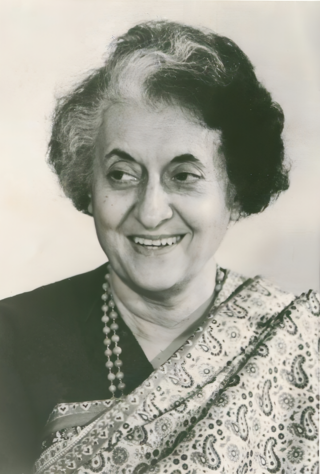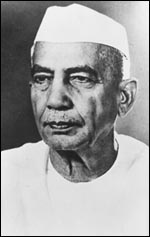| |||||
| Centuries: | |||||
|---|---|---|---|---|---|
| Decades: | |||||
| See also: | List of years in India Timeline of Indian history | ||||
Events in the year 1917 in India.
| |||||
| Centuries: | |||||
|---|---|---|---|---|---|
| Decades: | |||||
| See also: | List of years in India Timeline of Indian history | ||||
Events in the year 1917 in India.

Indira Priyadarshini Gandhi was an Indian politician and stateswoman who served as the 3rd Prime Minister of India from 1966 to 1977 and again from 1980 until her assassination in 1984. She was India's first and, to date, only female prime minister, and a central figure in Indian politics as the leader of the Indian National Congress. Gandhi was the daughter of Jawaharlal Nehru, the first prime minister of India, and the mother of Rajiv Gandhi, who succeeded her in office as the country's sixth prime minister. Furthermore, Gandhi's cumulative tenure of 15 years and 350 days makes her the second-longest-serving Indian prime minister after her father.

Rajivaratna Gandhi was an Indian politician who served as the 6th Prime Minister of India from 1984 to 1989. He took office after the assassination of his mother, then–prime minister Indira Gandhi, to become the youngest Indian prime minister at the age of 40. He served until his defeat at the 1989 election, and then became Leader of the Opposition, Lok Sabha, resigning in December 1990, six months before his own assassination.

The Indian National Congress (INC), colloquially the Congress Party or simply the Congress, is a political party in India with widespread roots. Founded in 1885, it was the first modern nationalist movement to emerge in the British Empire in Asia and Africa. At the beginning the party contained moderates and later extremists, but from the late 19th century, and especially after 1920, under the leadership of Mahatma Gandhi, the Congress became the principal leader of the Indian independence movement. The Congress led India to independence from the United Kingdom, and significantly influenced other anti-colonial nationalist movements in the British Empire.

Sonia Gandhi is an Indian politician. She is the longest serving president of the Indian National Congress, a social democratic political party, which has governed India for most of its post-independence history. She took over as the party leader in 1998, seven years after the assassination of Rajiv Gandhi, her husband and a former Prime Minister of India, and remained in office until 2017 after serving for twenty-two years. She returned to the post in 2019 and remained the President for another three years.

Morarji Ranchhodji Desai was an Indian independence activist and politician who served as the 4th Prime Minister of India between 1977 and 1979 leading the government formed by the Janata Party. During his long career in politics, he held many important posts in government such as Chief Minister of Bombay State, Home Minister, Finance Minister and 2nd Deputy Prime Minister of India.

Chaudhary Charan Singh was an Indian politician and served as the 5th prime minister of India between 28 July 1979 and 14 January 1980. Historians and people alike frequently refer to him as the Champion of India's peasants.
Events in the year 1984 in the Republic of India.
Events in the year 1966 in the Republic of India.

Maruthur Gopalan Ramachandran , also popularly known by his acronym M.G.R., was an Indian actor, politician, and philanthropist who served as the Chief Minister of Tamil Nadu from 1977 until his death in 1987. He was the founder and first general secretary of the All India Anna Dravida Munnetra Kazhagam. On 19 March 1988, M.G.R. was posthumously awarded the Bharat Ratna, India's highest civilian honour.

The Janata Party is a political party in India. It was founded as an amalgam of Indian political parties opposed to the Emergency that was imposed between 1975 and 1977 by Prime Minister Indira Gandhi of the Indian National Congress. In the 1977 general election, the party defeated the Congress and Janata leader Morarji Desai became the first non-Congress prime minister in independent modern India's history.

Sanjay Gandhi was an Indian politician and the younger son of Indira Gandhi and Feroze Gandhi. He was a member of parliament, Lok Sabha and the Nehru–Gandhi family.
Events in the year 1989 in the Republic of India.

Giani Zail Singh was an Indian politician from Punjab who served as the seventh president of India from 1982 to 1987. He was the first Sikh to become president.

Neelam Sanjiva Reddy was an Indian politician who served as the sixth president of India, serving from 1977 to 1982. Beginning a long political career with the Indian National Congress Party in the independence movement, he went on to hold several key offices in independent India — as Deputy Chief minister of Andhra state and the first Chief Minister of United Andhra Pradesh, a two-time Speaker of the Lok Sabha and a Union Minister— before becoming the Indian president.

The Emergency in India was a 21-month period from 1975 to 1977 when Prime Minister Indira Gandhi had a state of emergency declared across the country.
Events in the year 1968 in the Federal Republic of India.
Events in the year 1969 in the Republic of India.

Indira Gandhi National Open University, known as IGNOU, is a public research university located at Maidan Garhi, New Delhi, India. Named after the former Prime Minister of India Indira Gandhi, the university was established in 1985 with a budget of ₹20 million, after the Parliament of India passed the Indira Gandhi National Open University Act, 1985. IGNOU is run by the central government of India, and with a total active enrollment of over 4 million students, it is the largest university in the world.

The Nehru–Gandhi family is an Indian political family that has occupied a prominent place in the politics of India. The involvement of the family has traditionally revolved around the Indian National Congress, as various members have traditionally led the party. Three members of the family—Jawaharlal Nehru, Indira Gandhi and Rajiv Gandhi—have served as the prime minister of India, while several others have been members of parliament (MP).
The State of Uttar Pradesh v. Raj Narain was a 1975 case heard by the Allahabad High Court that found the Prime Minister of India Indira Gandhi guilty of electoral malpractices. The ruling on the case that had been filed by the defeated opposition candidate, Raj Narain, Justice Jagmohanlal Sinha invalidated Gandhi's win and barred her from holding elected office for six years. The decision caused a political crisis in India that led to the imposition of a state of emergency by Gandhi's government from 1975 to 1977.